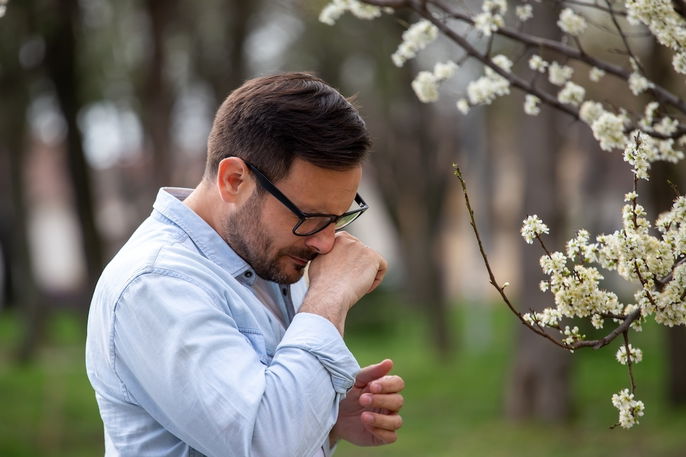Nose burning can be caused by a change in climate or room temperature, but it can also be a symptom of a health condition, like hay fever, a sinus infection, and even menopause.
A burning nose sensation is usually not serious, but it can be uncomfortable. If the burning occurs with other symptoms, like fever, dizziness, or nosebleeds, you should follow-up with your doctor to confirm whether there is an abnormality or illness triggering it.
The nose is one of the body’s defense mechanisms against foreign invaders. It heats and filters inhaled air, which impedes microorganisms and pollutants, like dust, from entering the respiratory tract. Nose burning may be a sign that this mechanism is not functioning correctly, and therefore should be assessed by a doctor.

Why is my nose burning?
Nose burning can be caused by:
1. Changes to climate
Dry weather is the main cause of a burning nose sensation. This happens because air that is too hot or lacking humidity will the dry up the airways, which can result in your nose burning when inhaling..
In addition to dry weather, being exposed to air conditioning for a long time may also dry-out the nasal mucosa and lead to a burning nose sensation.
How to stop it: One way to stop your nose from burning during dry weather is to simply place a bowl of water in your bedroom. This will add humidity to the air. In addition, it’s important to ensure plenty of water intake during periods of dry weather. You can also rinse your nostrils with a 0.9% saline solution.
2. COVID-19
Many people with infected with COVID-19 may experience a loss of smell and a burning sensation in the nose. These symptoms typically resolve a few weeks after infection, with smelling returning to normal and discomfort disappearing on its own. However, some people may continue to notice changes, like nose burning and difficulty smelling, well after the infection has cleared.
How to stop it: There is no specific treatment for mild to moderate COVID-19 infections. Symptoms can be managed at home with plenty of rest, fluids and analgesics for headaches or fever. Nose burning may disappear after the infection, although some patients reported persistent distortions in smelling ability and discomfort even after the infection has resolved.
Chronic symptoms that persist following COVID-19 infections, or long COVID symptoms, should be discussed and evaluated by your doctor on a case-by-base basis for a more targeted management plan.
3. Hay fever
Hay fever is an inflammation of the nasal mucosa caused by the presence of irritants, such as dust, pollen, pet hair, feathers, perfume, or disinfectants. These substances cause irritation in the mucosa, leading to rhinitis and itchiness, as well as a burning sensation in the nose.
How to stop it: To prevent hay fever, it’s important to ensure your house is free of the agent that triggers symptoms. This can be done with regular cleaning. In more serious cases, your doctor may prescribe may antihistamines or allergy injections.
4. Sinus infection
A sinus infection, or sinusitis, is an inflammation of the sinuses which causes a headache, pressure in the head, rhinitis, and, at times, a burning nose sensation. Sinusitis can be caused by the influenza virus or by bacteria. It is important to that the infection is diagnosed so that prescribed treatment can be effective. Some people report the sensation of burning sinuses. See what other symptoms a sinus infection can cause.
How to stop it: Your doctor will initiate treatment for a sinus infection according to the cause. He or she may prescribe antibiotics or antivirals. To help with the pressure sensation in the head, you can take decongestants. Check out some home remedies for sinus infections you can try to complement your medical treatment.
5. Cold and flu
Both the cold and flu viruses can cause sneezing, rhinitis, and a sensation of burning nostrils due to irritation of the nasal mucous in the airways. Check-out how to identify a cold versus a flu and how these can be treated.
How to stop it: To fight either virus, you may need to take medication to relieve the symptoms, such as acetaminophen. Ensure adequate hydration by drinking plenty of fluid, such as juice and water. Read about home remedies for the cold and flu that you can use in addition to your prescribed treatment.
6. Medication
Some medications may dry out the nasal mucosa as a side effect. This is especially true with nasal sprays or decongestants. Some sprays contain ingredients that can irritate the nose, which can actually increase the risk for infection.
How to stop it: If a burning nose sensation is related to your medication use, it’s important to report your symptoms to your doctor and discuss alternatives. With nasal decongestants, the doctor may prescribe a different type that does not contain and irritating chemical substances. Nasal irrigation with cool water can also be relieving and beneficial to some people when medication changes are not advised.
7. Sjögren Syndrome
Sjörgen syndrome is an auto-immune disease caused by inflammation of various body glands. It often results in a dry mouth, dry eyes, and, occasionally, a dry nose.
How to stop it: Diagnosis and treatment of symptoms like dry mouth, difficulty swallowing, difficulty talking, dry eyes, and sensitivity to light, is typically directed by a rheumatologist. See your doctor if you have any of these symptoms.
When to see a doctor
You should see the doctor if the burning nose sensation lasts for more than one week and if it accompanied by other symptoms, such as:
- Difficulty breathing
- Headache
- Throat ache
- Nose bleeding
- Fainting
- Dizziness
- Fever
In addition, if you are experiencing dryness elsewhere (e.g. eyes, mouth, and genitals), it is important to see your doctor, as these could be related to more serious illnesses, such as Sjörgen syndrome.






























